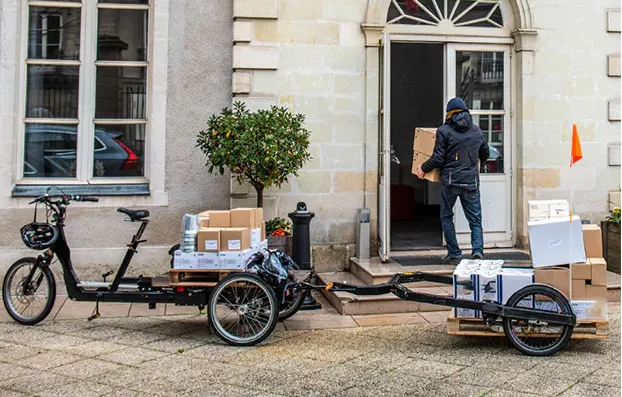
Photo: Popov | Dreamstime.com
Cities should appoint Chief Decarbonisation Officers, says new report
29 July 2021
by Sarah Wray
Alongside the Chief Digital Officer and Chief Data Officer, there could soon be a new CDO at City Hall: the Chief Decarbonisation Officer.

A new report from StateUp, an international intelligence and advisory firm for public-purpose technology, says that to address the climate crisis, governments at all levels must look beyond setting policy for the economy alone and also focus on decarbonising their own organisations, buildings and operations.
These efforts could be led by a newly created role of Chief Decarbonisation Officer, according to the States Regenerate: Greening Government for our Planet, Wealth, and Health report.
Dr Tanya Filer, StateUp founder and CEO, who also leads the Digital State programme at the University of Cambridge’s Bennett Institute for Public Policy, said: “Governments that invest in decarbonising their own operations will reap benefits in terms of a headstart in meeting climate goals, health benefits from cleaner air and more liveable buildings, and economic benefits in terms of economic stimulus: new skills, new jobs, and new companies.”
The research, which features input from academics from the UK Geospatial Commission and Cambridge, Oxford, and Yale Universities, highlights the opportunities governments have to reduce their own emissions in four key areas: infrastructure and the built environment; reforming procurement procedures; managing natural resources like water reserves, air quality and trees; and promoting the use of data innovation. Alongside policy reform, technologies such as drones, digital twins, smart grids and citizen engagement platforms could play a key role.
Role with ‘teeth’
The role of Chief Decarbonisation Officer, with supporting budget, resources and influence in the organisation, is recommended at the national level to co-ordinate and track efforts, but Dr Filer told Cities Today: “I absolutely think there’s a need for that role in our larger cities too.”
This reflects the emergence of other senior climate-related titles in cities, including the rise of Chief Resilience Officers and the recent creation of the Chief Heat Officer position. The Chief Decarbonisation Officer would also work alongside their fellow CDOs in data and digitalisation.
“Decarbonisation Officers could learn from the experience of government digitalisation, which began earlier but is similar in the sense that you need a whole-government approach,” Filer said.
What is crucial is that the new CDO role has “teeth” rather than being perfunctory, Filer noted. They could also play a key role in upskilling the wider organisation and procurement teams.
The Canadian government, for instance, created the Canadian Centre for Greening Government and Singapore established GreenGov.SG.
Government, green thyself
StateUp argues that governments have a unique capacity to drive decarbonisation because of their purchasing power and dominant role in financing and managing assets like infrastructure. According to the World Bank, governments globally spent US$11 trillion in 2018 on procuring goods and services, which StateUp says could be shifted to green purchasing. Public procurement forms at least 12 percent of global GDP and in developing countries alone 83 percent of investments in infrastructure projects are sponsored by government entities and state-owned enterprises.
Filer commented: “In terms of COVID-19 responsiveness, there has been a very strong focus on a green recovery, which has primarily meant greening the economy and ‘building back better’. There’s much less attention on government-owned procurement power and the role this has to play both in terms of determining the future of their own organisations and operations, but also using that to catalyse change in the broader economy.”
She says the report offers clear lessons for different levels of government. Cities can play a particularly important role in citizen engagement and the built environment. They can also help to inform national policy and pilot new programmes.
“Cities are often the hotbeds of innovative approaches and have an openness to experimentation. They are also often closer to the problems and challenges that citizens are facing,” Filer said.
An example of the dovetailing of digital and sustainability was recently seen in Milan, Italy. The city developed a tool that calculates the outcomes of digitalisation in terms of time, money and emissions saved – both for residents and the municipality.
Start-ups
The States Regenerate report identifies 50 start-ups from 22 countries that can help governments with their decarbonisation goals. These include UrbanFootprint, which is software for land use and mobility planning; The Future Fox, a digital participation platform; Aclima, a system for hyperlocal air quality data and insights; and RanMarine, which offers autonomous drones to clean waterways and collect data.
The companies were independently sourced through Nebula, StateUp’s newly launched platform to better connect technology innovators and government using data and digestible research and analysis.
Dr Filer said: “We created Nebula knowing that decisionmakers’ expectations for the kind of information they receive and how they receive it are changing, particularly as ‘millennials’ take on leadership roles in policy, consultancy, and the technology ecosystem.”
Image: Andrey Popov | Dreamstime.com











